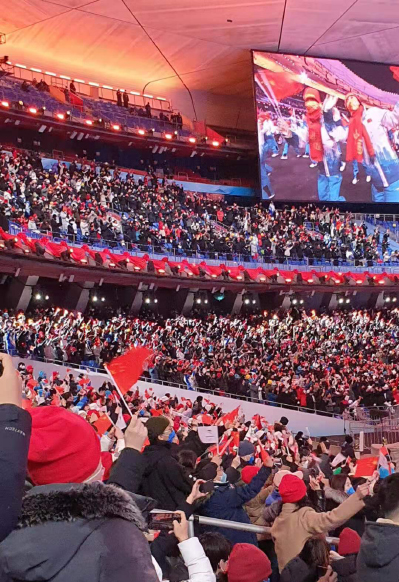| Latest News |
| The Paralympic opening, a warm-hued tale of visual bravura | |
| The multiple scenes of people reconnecting create movement and momentum | |
|
|
 Team China rouses a stadium-wide roar when entering the Bird's Nest at the opening ceremony of the Paralympic Winter Games Beijing 2022 in Beijing on March 4 (ELSBETH VAN PARIDON)
Art and design use warm colors to represent fire, light, hot landscapes, passion... And the Paralympic soul. On March 4, a mishmash of reds, oranges, yellows, violets, and so the list continues, danced through the night skies of China's capital. The cauldron was lit, signaling the start of the Paralympic Winter Games Beijing 2022. Zhang Yimou, also known as the master of visual bravura, once again lived up to his reputation and orchestrated a striking opening ceremony inside the Bird's Nest, where hundreds of athletes from around the globe had gathered to share in a feast of snow and ice. Yours truly was in the audience, getting blown away by both gusts of wind and Zhang's genius—yes, I'm a big fan of the man. A quick honorable mention goes to head of the International Paralympic Committee Andrew Parsons' impassioned and empowered appeal to the world to commit to connection and not cave in to conflict—noted by many a media outlet as a bold call for peace. The storytelling portion of the ceremony featured a mix of performers with and without disabilities. They acted out some of life's more valued moments side by side—from a visually impaired girl lighting a red lantern, we'll circle back to that item in a jiffy, and placing it on the world's largest high-definition LED floor screen, to a family chasing their dreams and an elderly man dancing with a young boy. The multiple scenes of people reconnecting created movement and momentum across the stadium. At one point, two boys colored the Paralympic symbols—red, blue and green shapes representing movement—on the palm of Hsiao Huang-chi, a prominent, visually impaired Chinese singer. Another performer pressed her palm to his and revealed the logo on her own hand. Then everyone on stage lifted their hands to reveal the same colorful marks. And onlookers lifted up eyes to the skies. After displaying the Paralympic Agitos, agito being Latin for "I move," the pyrotechnic display turned purple in a nod to WeThe15, a global campaign aimed at increasing the visibility, inclusion and accessibility of the world's 1.2 billion people with disabilities, or 15 percent of the global population. In both the lit and LED spheres, the warm-hued imagery was rather befitting given the 2022 Paralympic mascot is an anthropomorphic glowing red lantern named Shuey Rhon Rhon. Note to all: roly-poly panda Bing Dwen Dwen stole the show and stirred up a nationwide consumer craze as the Olympic mascot last month. The name "Shuey Rhon Rhon" has several layers to it. "Shuey" has the same pronunciation as the Chinese character for snow, while the first "Rhon" means "to include, to tolerate." The second "Rhon" denotes "to melt, to fuse" and "warm." Combined, the full name of the mascot promotes the desire of having greater inclusion for people with impairments throughout society, and more dialogue and understanding between the cultures of the world. The red mascot is a Chinese lantern, whose design features elements from traditional Chinese papercutting and ruyi ornaments. The red lantern itself is an ancient cultural symbol in the country, associated with harvest, celebration, prosperity and brightness. The glow emanating from Shuey Rhon Rhon's heart (surrounding the Beijing 2022 Winter Paralympics logo) symbolizes the friendship, warmth, courage and perseverance of Para athletes—traits that inspire people around the world every day. The Parade of Nations took off some 15 minutes into the ceremony, led by the delegation from Belgium. Countries typically enter in the order of the host country's alphabet—and in Beijing, that went by the stroke order of the first character in each country's simplified Chinese name. It featured teams both big and small. China's was, as per usual, the largest—with 96 athletes, followed by Team USA with 65. Other delegations, such as those of Puerto Rico and Israel, were represented by a single athlete each. Quick honorable mention: Team Mexico, rolling in like a mariachi band. Team China (Zhongguo) wrapped up the parade, rousing a stadium-wide roar. And on a final Z note: Zhang, you're the master. (Print Edition Title: Pride and Pyrotechnics) The author is an editorial consultant with Beijing Review Comments to elsbeth@cicgamericas.com |
|
||||||||||||||||||||||||||||
|
